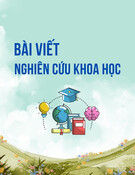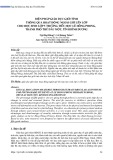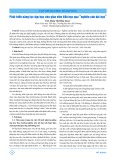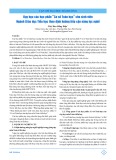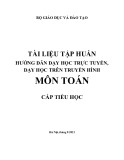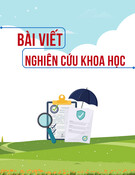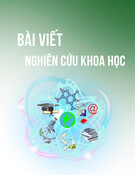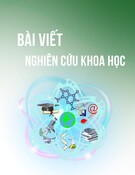
129
HNUE JOURNAL OF SCIENCE
Educational Sciences 2024, Volume 69, Issue 4, pp. 129-138
This paper is available online at https://hnuejs.edu.vn
DOI: 10.18173/2354-1075.2024-0170
ESTABLISHING EXTENSIVE READING CORPUS TO DEVELOP EMOTIONAL
INTELLIGENCE FOR 5TH-GRADE STUDENTS
Do Xuan Thao1 and Dinh Thi Ngoc Mai2*
1Hanoi National University of Education, Hanoi city, Vietnam
2Dong My High school, Hanoi city, Vietnam
*Corresponding author Dinh Thi Ngoc Mai, email: doanmoctieuthu@gmail.com
Received July 17, 2024. Revised August 18, 2024. Accepted September 10, 2024.
Abstract. In regards to the obstacles in teaching and studying extensive reading in
elementary schools, the goals of the 2018 Literature National Curriculum as well as the
acknowledgment of the role of emotional intelligence development for students in life, it is
necessary to conduct a discussion in terms of theories about emotional intelligence and a
survey of extensive reading education in elementary schools. In practice, elementary school
students have been receiving extensive reading (previously as supplementary reading and
now as a requirement in the output standards of the 2018 Literature National Curriculum).
However, apart from the master's thesis of author Le Thi Hang [1] which is considered an
opening thesis for building reading materials to develop emotional intelligence in elementary
schools, there have been no studies on building and exploiting extensive reading materials to
develop emotional intelligence for elementary school students in specific grades
explicitly and systematically. Based on multiple studied theories, we have established an
extensive reading corpus system to develop emotional intelligence for 5th-grade students.
Keywords: extensive reading corpus, corpus for developing emotional intelligence, extensive
reading for 5th-grade students.
1. Introduction
Today, besides general qualities, abilities, and professional competencies, educators are the
most concerned about the development of learner's emotional intelligence. Emotional intelligence
education aims to guide students to develop harmoniously both physically and mentally,
especially in life skills education. However, the development of emotional intelligence for
students in school remains facing multiple obstacles, especially regarding elementary school
students, who are in the process of developing and cultivating their minds and physiology.
In 1990, Peter Salovey, John Mayer, and David Caruso with their research on Emotional
Intelligence (Emotional quotient - EQ or Emotional intelligence - EI) [2] explained emotional
intelligence quite completely. Among them, three researchers are especially interested in
controlling and regulating the emotions of oneself and others, using those emotions to guide
thoughts and actions. In 1995, the book “Emotional Intelligence” [3] by Daniel Goleman defines
emotional intelligence more specifically and systematically. However, Goleman's research still
does not clearly distinguish between emotional intelligence and human personality. Around the
world, research projects on emotional intelligence have initially proposed, given definitions, and
built models of emotional intelligence. However, research projects have only paid attention to





